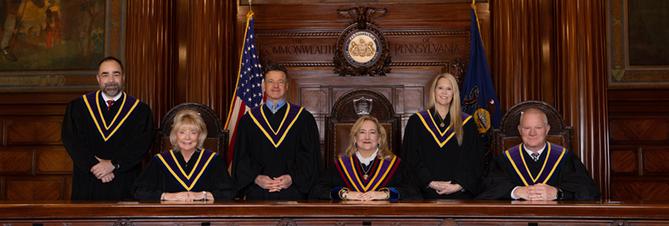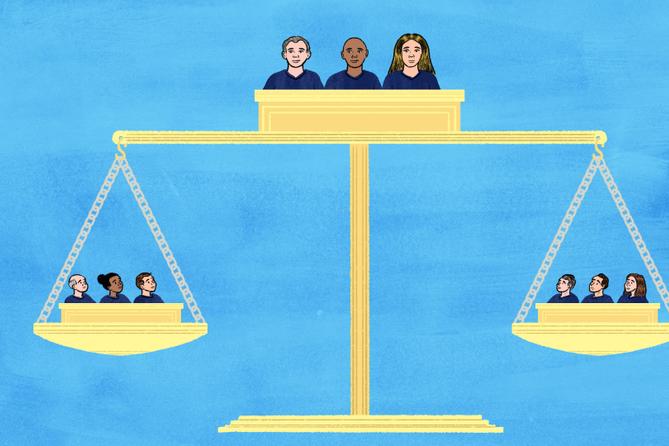Spotlight PA is an independent, nonpartisan, and nonprofit newsroom producing investigative and public-service journalism that holds the power to account and drives positive change in Pennsylvania. Sign up for our free newsletters.
At a quick glance: The Pennsylvania Supreme Court is made up of 7 justices. Currently, there are 4 Democrats and 2 Republicans that serve on the court. Voters in November 2023 elected a Democrat to fill 1 vacancy. To qualify for a seat on the court, candidates must have state residency for at least one year and reside in the commonwealth throughout their term. They must be at least 21 years of age, but not older than 75. They also have to be a member of the Bar of the Pennsylvania Supreme Court and licensed to practice law in the state.
Pa. Supreme Court 101
The Supreme Court of Pennsylvania is the highest court in the state and the oldest appellate court in the nation, dating back to 1684. Comprised of seven justices, the court is responsible for interpreting Pennsylvania’s laws and Constitution to make final judgments on a wide range of legal questions.
State Supreme Court justices review appeals from the state’s two lower appellate panels, the Commonwealth and Superior Courts, and also have the power to intervene in any lower court case they choose. The court additionally oversees the state’s judicial system, which includes administering the state bar exam and disciplining lawyers who violate ethics rules.
Decisions by the state Supreme Court have affected the lives of virtually every Pennsylvanian. In the past decade alone, the court has ruled on cases that preserved access to mail voting, found that revenue from oil and gas drilling on state land should go toward environmental conservation, and allowed clergy implicated in — but not convicted of — sexual abuse to have their names shielded.
As with all three of Pennsylvania’s appellate courts, Supreme Court justices are elected in partisan contests — a practice only seven states in the nation use.
Other options for judicial selection include nonpartisan elections and appointment by a selection committee, the governor, or the legislature — all methods that are generally designed to insulate judges from politics.
Pennsylvania’s judicial races are statewide, and have a lot in common with elections for political office: Judges run under the umbrella of a party, form campaign committees to raise money, and are endorsed by political organizations. However, judicial candidates also follow much stricter campaign rules than most political hopefuls. They can’t ask for donations directly — that must be done via their political committees — and they also can’t promise to rule in a particular way while on the campaign trail.
Once elected, justices serve 10-year terms. At the end of a term, they can either be retained or rejected in a statewide yes-or-no vote, which they rarely lose. There is no limit to the number of terms a judge can serve, however, they must retire at age 75.
Currently, the court has four Democratic justices, two Republicans, and one vacancy after the 2022 death of Chief Justice Max Baer. Voters selected Democrat Daniel McCaffery to fill that vacancy during the 2023 November election. He will be sworn in this January.

Frequently asked questions about the Pa. Supreme Court:
Where can I find the Pa. Supreme Court opinions and docket?
Court opinions and docket sheets — statements of actions and filings for cases — are available online. To learn how to search dockets, check out this guide. The court system also maintains a webpage of cases it deems especially relevant to the public.
Who are the PA Supreme Court justices?
Chief Justice Debra Todd (elected as a Democrat)
Justice Christine Donohue (elected as a Democrat)
Justice Kevin M. Dougherty (elected as a Democrat)
Justice David N. Wecht (elected as a Democrat)
Justice Sallie Updyke Mundy (elected as a Republican)
Justice P. Kevin Brobson (elected as a Republican)
Incoming Justice Daniel McCaffery (elected as a Democrat)
Can Pa. Supreme Court justices be impeached?
Impeachment of a Supreme Court justice is rare, but possible. Pennsylvania's constitution allows for the impeachment of a judge for “misbehavior in office” by the state House of Representatives. The state Senate must then conduct a trial, and decide whether to convict or acquit.
In 1994, former state Supreme Court Justice Rolf Larsen was removed from the high court and convicted on impeachment charges by the state Senate.
Larsen was impeached by a majority of the state House and convicted by two-thirds of the state Senate for meeting privately with an attorney to decide the outcomes of cases.
How are Pa. Supreme Court justices chosen?
Justices are elected to 10-year terms in statewide elections. They have no term limits. Should there be a vacancy before an election, the governor can appoint someone, but this selection would be subject to state Senate confirmation.
BEFORE YOU GO… If you learned something from this article, pay it forward and contribute to Spotlight PA at spotlightpa.org/donate. Spotlight PA is funded by foundations and readers like you who are committed to accountability journalism that gets results.

